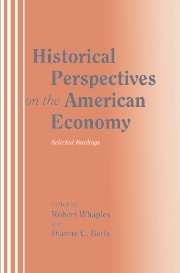Book contents
- Frontmatter
- Contents
- Acknowledgments
- Introduction to students
- Introduction to instructors
- Contributors
- I Introduction
- II Colonial and early national economy
- 2 “An economic interpretation of the American Revolution”
- 3 “The market and Massachusetts farmers, 1750–1855”
- III Slavery and servitude
- IV The South since the Civil War
- V The rise of American industrial might
- VI Populism
- VII Women in the economy
- VIII The Great Depression
- Appendix: Basics of regression
- Glossary
- Name index
- Subject index
2 - “An economic interpretation of the American Revolution”
Published online by Cambridge University Press: 05 June 2012
- Frontmatter
- Contents
- Acknowledgments
- Introduction to students
- Introduction to instructors
- Contributors
- I Introduction
- II Colonial and early national economy
- 2 “An economic interpretation of the American Revolution”
- 3 “The market and Massachusetts farmers, 1750–1855”
- III Slavery and servitude
- IV The South since the Civil War
- V The rise of American industrial might
- VI Populism
- VII Women in the economy
- VIII The Great Depression
- Appendix: Basics of regression
- Glossary
- Name index
- Subject index
Summary
The Atlantic economy in the half century before American Independence underwent deep, wrenching changes. As a result, English capital and English decisions increasingly dominated the colonial economy. The freedom of the wealthy colonists, merchants and planters alike, to conduct business as they chose was restricted. Profit margins were lessened and possibilities for local development sacrificed. These broad, structural changes, and the accompanying short-run economic crises, troubled the colonial elite at least as much as did the parliamentary enactments which followed the Seven Years War. These new British measures remain one ostensible cause of revolt. But the colonial reaction to them was determined in large part by a growing concern for the economy and for economic sovereignty, a concern that only coincidentally reinforced the dictates of patriotic principle.
This transformation of the colonial business world is the framework for the following broad and tentative reinterpretation of the American Revolution. Our reinterpretation, however, does not argue a monocausal explanation for the colonies' struggle with Britain. Consequently, an examination of the strengths and weaknesses of earlier writers provides a necessary introduction to the presentation of a new hypothesis.
Modern historians of the American Revolution conveniently fall into two schools: the Progressive and the neo-whig. In seeking to explain the colonists' break with the mother country, Progressive authors wrestled with two stubborn problems for which they never achieved a happy resolution. One was the question of the impact of the Navigation Acts.
- Type
- Chapter
- Information
- Historical Perspectives on the American EconomySelected Readings, pp. 42 - 70Publisher: Cambridge University PressPrint publication year: 1995



